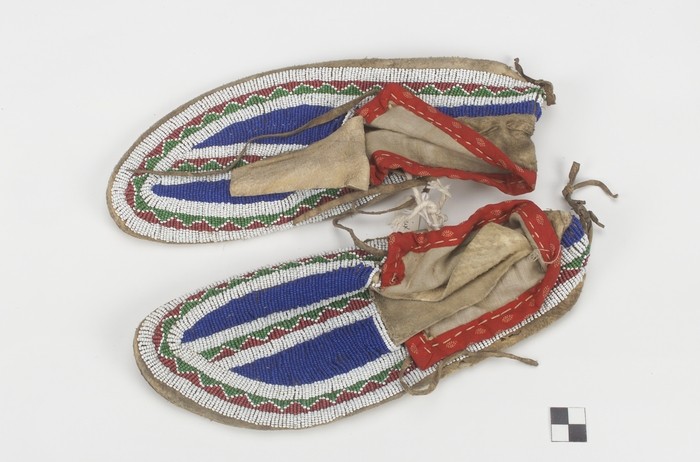Date & time
11 a.m. – 4 p.m.
Registration is closed
Registration is closed
This event is free
Clandestine Transactions Working Group, CISSC, Centre for Sensory Studies, the Ethnography Lab
Engineering, Computer Science and Visual Arts Integrated Complex
1515 St. Catherine W.
Room 10.625
Yes
 Moccasins, circa 1890, Sioux, South Dakota, Smithsonian National Museum of the American Indian, http://n2t.net/ark:/65665/ws6b3e755b7-7803-4ce3-96ed-3e08a34acfae
Moccasins, circa 1890, Sioux, South Dakota, Smithsonian National Museum of the American Indian, http://n2t.net/ark:/65665/ws6b3e755b7-7803-4ce3-96ed-3e08a34acfae
This workshop will provide instruction and training for students to develop techniques for working with material culture from various religious traditions. What becomes of religious objects and belongings that are transacted into becoming museum artifacts? What ontological framings become relevant in anticolonial and decolonial interventions in museum anthropology? What responsibilities do researchers have towards belongings, communities, and institutions, when these can have contrasting and contradictory politics? In this workshop, students will learn about the methodological possibilities available to them when approaching such objects and topics for research.
Students will do a close looking/touching/sensory engagement exercise with a variety of items from several religious traditions as sources of evidence. Students are also encouraged to bring an object to the workshop that represents an aspect of a religious tradition or spiritual relationship. Items must belong to the student, be portable (i.e. stable enough to be transported to/from the workshop), be comfortable as a topic for collective discussion, and not be of high monetary value. Students can consider material culture that interests them based on its social history, materials & style, techniques of production, or other characteristics.
Interested students, please apply using the Registration link.
Required Readings
Inuit Piqutingit / What belongs to Inuit (2009; Dirs: Bernadette Dean
& Zacharias Kunuk); Isuma TV: https://www.isuma.tv/isuma-productions/inuit-piqutingit)
*Students should pay attention to the kinds of embodied and sensory interactions between Inuit and their heritage, and the moments when spiritual relationships are expressed.
Maureen Matthews, Roger Roulette and James Brook Wilson. 2021. “Meshkwajisewin: Paradigm Shift”. Religions 12(10): 894. https://doi.org/10.3390/rel12100894
11 a.m. to 12:30 p.m. Methodology Workshop
12:30 to 2 p.m. Lunch break (Catered; free for those who register)
2 to 4 p.m. Case Studies and Discussion
Laura Peers has opened dialogues between Indigenous communities in North America and museums across the UK, Europe and North America. A historian and museum anthropologist as well as a curator, her research and curatorial practice has focused on historic Indigenous cultural items, and she explores both the detailed histories of items in museum collections and the meanings of heritage objects to Indigenous people today.
Laura has managed complex international projects linking museums and Indigenous communities, including the Great Box Project with the Haida Nation, the Blackfoot Shirts Project with all four Blackfoot Nations, and recently the To Honour and Respect project with the six Mississauga Nations. She has surveyed historic wampum in U.K. collections. She is Emeritus Curator, Pitt Rivers Museum, and Emeritus Professor of Museum Anthropology at the University of Oxford, is Adjunct Professor in the Graduate Faculty, School for the Study of Canada and Department of Anthropology, at Trent University.
Cara Krmpotich is associate professor and former director of the Museum Studies Program at the University of Toronto’s Faculty of Information. She is Co-Director of the Great Lakes Research Alliance (GRASAC), an Indigenous-Settler network committed to reuniting Great Lakes cultural belongings with Great Lakes places, knowledge systems and peoples. Cara is passionate about expanding museological approaches to the care of collections, critically engaging with practices of cataloguing, object handling, repatriation, digital stewardship, and policy.
Cara has worked in university, civic and national museums in Canada and the UK, and her approaches are shaped by research relationships with Indigenous, South African, and British colleagues. She is currently co-editing a volume with Alice Stevenson titled Collections Management as Critical Museum Practice being published by UCL Press in 2024. She is also author of The Force of Family: memory, repatriation and kinship on Haida Gwaii, and with Laura Peers, the Haida Repatriation Committee and staff of the British Museum and Pitt Rivers Museum, This Is Our Life: Haida material heritage and changing museum practice. Cara is a mother, and enjoys fitness training, puzzles, baking, and dog walking.
© Concordia University